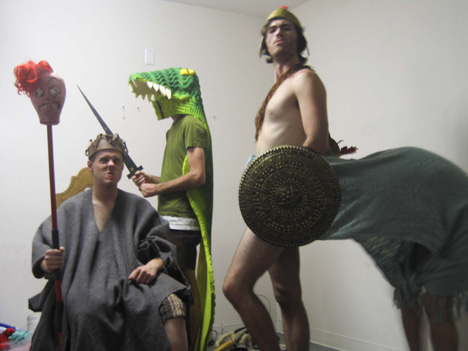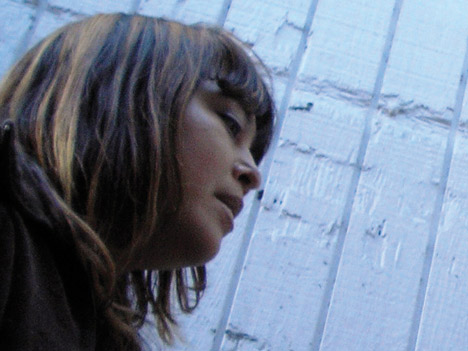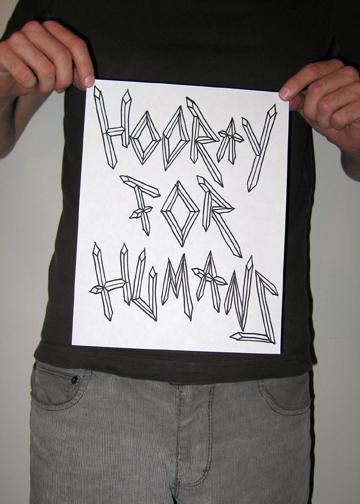Posted on Sunday 5 April 2009
By Greggory Moore
The Museum of Latin American Art’s first-ever theatrical event was business as usual for Alive Theatre, who in their short existence have formed a habit of making non-traditional venues fit to their purposes, purposes that have ranged from the high literary to burlesque and camp. On March 29 it was José Rivera’s References to Salvador Dali Make Me Hot, a bit of minor-key magic realism that unfolded without a hitch in MOLAA’s outdoor sculpture garden.
Dali centers around the intermixed dreaming and wakefulness of Gabriela, a 26-year-old army wife who wonders if the husband with whom she once marveled at the moon is the same as the Benito who will return the next day from a year-long tour of duty in the (first) Gulf War, or if life as he has known it has purged from him all sense of metaphor and wonder. Helping Gabriela (and us) explore dialectics such as spirit/flesh, intimate/estranged, secret/open, and feral/tame are her housecat and a coyote, a 14-year-old peeping Martin, and the moon himself (who plays a mean violin). With Dali, Rivera (best known for his Academy Award-nominated screenplay of The Motorcycle Diaries) serves up work that probably owes more to the North-American Beat movement than to the Latin-American Boom, as often what his prose evokes is far more important than what it directly communicates — a state of affairs particularly salient to Gabriela’s internal landscape, where real meaning lies beyond simple actuality. “Everyone dreams,” she says. “It’s only human” — but these dreams are the moon’s report to you as a witness of your life, a report given so that humans have a chance in this desert of a world.
It is almost surprising that MOLAA had never featured a play, as the sculpture garden, with its concrete stage and plethora of good seating (with heat lamps!), seems custom-made for such an endeavor. Another near-surprise is the choice of Dali for its inaugural production, as the nationality of the author (Puerto Rican) is the only real Latin-American tie-in. Yes, Gabriela, Benito, and Martin are Latino, but this fact is completely irrelevant to the story. (Of course there’s no reason Latino characters must be featured dealing with Latino issues; the play certainly doesn’t suffer because these do not.)
What is not at all surprising is the quality of the acting, as Alive Theatre’s most consistent achievement to date is casting the talent to the role. Here, the cat-coyote pair of Alexis Ehrman and Anderson William execute their supporting turns with the vigor of leads, while Ali Sohaili (Martin) steals just about every scene he’s in. Meanwhile, Angela Lopez’s Gabriela is just as believable when she treads the realm of the incredible as when she is confronting the harsh light of day. But perhaps most impressive Angel Correa, who plays each side of his dual role as Benito and the moon expertly enough to make your suspension of disbelief easy, by turns funny and pathetic, crude and debonair, overheated and cold. Beyond their individual achievements, the cast as a whole gels perfectly, properly bringing to life a script that could easily get lost in translation. Clearly much credit here goes to Xiomara Cornejo, whose strong direction also comes through in the blocking and rhythmic interplay of the actors.
It is a shame that Alive Theatre’s References to Salvador Dali Make Me Hot at MOLAA will be performed only once more (April 10, 8 p.m.), as it is hard to imagine the combination of the script, venue, and execution not winning enough good buzz to make for a strong run. But there’s not much that’s conventional about the production, so why should this any be different?
For more information, visit alivetheatre.org or molaa.org.



